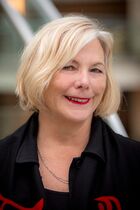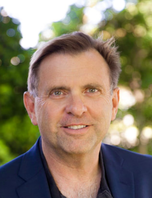
Glen Hearns is the principal of Eco-Logical Resolutions and co-director of the Transboundary Water Initiative at the University of British Columbia. He has worked in over 25 countries throughout the globe on a variety of assignments related to water, energy, mining and health. With over 30 years of professional work in resource management and decision making, conflict resolution and strategic planning he brings a wealth of experience to the table. Most recently he advises the government of Afghanistan on its transboundary water issues and was hired by the World Bank to lead their capacity building efforts in international waters in Afghanistan. See Curriculum Vitae.
His research and work focuses on applying structured approaches to make strategic choices around resource use and policy, and promoting cooperation over shared resource. He has applied this to various sectors including water management, waste disposal, energy, local economic development, biology and conservation. His clients range from local communities, municipalities, regional governments, First Nations, national governments and international organizations. Between 1998-2001 he helped facilitate the Crucible Group: an international multi-disciplinary international think tank on genetic resources.
He holds a PhD from the Institute of Resources, Environment and Sustainability of UBC (combined with Law), an MSc. in Policy Planning from IHE Delft (The Netherlands), and a BSc. in Geophysics from the University of Waterloo.
Eco-Logical Resolutions has a network of professionals to call upon when approaching a problem so that nothing is too unique to be solved.
Most personally rewarding project : Working with the Ticuna indians in the Amazon to develop genetic resource protection legislation in Colombia. I learned that despite lots of preparation there are always elements of the equation that are unpredictable. Very unpredictable - but immensely rewarding.
His research and work focuses on applying structured approaches to make strategic choices around resource use and policy, and promoting cooperation over shared resource. He has applied this to various sectors including water management, waste disposal, energy, local economic development, biology and conservation. His clients range from local communities, municipalities, regional governments, First Nations, national governments and international organizations. Between 1998-2001 he helped facilitate the Crucible Group: an international multi-disciplinary international think tank on genetic resources.
He holds a PhD from the Institute of Resources, Environment and Sustainability of UBC (combined with Law), an MSc. in Policy Planning from IHE Delft (The Netherlands), and a BSc. in Geophysics from the University of Waterloo.
Eco-Logical Resolutions has a network of professionals to call upon when approaching a problem so that nothing is too unique to be solved.
Most personally rewarding project : Working with the Ticuna indians in the Amazon to develop genetic resource protection legislation in Colombia. I learned that despite lots of preparation there are always elements of the equation that are unpredictable. Very unpredictable - but immensely rewarding.

Susan Bazilli has 30 years experience in multiple aspects of gender equality and women’s empowerment: women’s legal rights incorporated into legal frameworks; international human rights law such as CEDAW; gender, climate change and environment; capacity building of grassroots NGOs. See CV Susan has lived and worked for 10 years in Southern Africa and has worked in almost 40 countries throughout her career in Eurasia, Asia, North America, Africa. She has worked with many women’s NGOs and CSOs in many capacities, as an Executive Director, an evaluator, trainer, capacity builder and advisor. As the Director of the International Women’s Rights Project, her work focuses on strengthening the capacity of grassroots NGOs through developing strategic alliances and partnerships. Her evaluation experience on women’s rights issues has varied from a USAID small grants program on women’s economic empowerment in Afghanistan to how the International Women’s Rights Action Watch – Asia Pacific (IWRAW-AP) has implemented their women’s rights programs to how the UN coalition Global Gender Climate Alliance (GGCA) carried out their mission on women and climate change. Susan uses a feminist theory of evaluation in all of her evaluative work, which was critical while undertaking the gender thematic evaluation of UNDP’s gender policy’s environment program, where she used outcoming harvesting as her methodology. She has worked on several Global Environment Facility projects, drafting their Gender Equality Action Plan, evaluating GEF partners on their inclusion of gender in their projects, and has engendered projects such as the Maldives National Implementation Plan on the eradication of POPs, and the Central Asian Regional Environment Centre’s transboundary ‘Smart Waters’ project. She has mainstreamed gender into green economy projects for the OSCE and the ADB. Susan is recognized for her leadership, sound judgement, ability to alliances across sectors and adapt in varied cultural settings.
She is experienced in qualitative designing of data collection tools, eg. Focus Group Discussion Protocols and Key Informant Interview questionnaires, using methodologies from Outcomes Harvesting to Most Significant Change. Susan has a comprehensive understanding of Canada’s Feminist International Assistance Policy (FIAP) and its application to multiple sectors.
She is experienced in qualitative designing of data collection tools, eg. Focus Group Discussion Protocols and Key Informant Interview questionnaires, using methodologies from Outcomes Harvesting to Most Significant Change. Susan has a comprehensive understanding of Canada’s Feminist International Assistance Policy (FIAP) and its application to multiple sectors.

Richard Kyle Paisley is currently the Director of the Global International Waters Initiative at the Institute for Asian Research (IAR-UBC) in Vancouver, British Columbia, Canada; and head of the European Union - Technical Assistance Project with Afghaistan's Ministry Of Foreign Affairs. See CV. Richard's academic background includes undergraduate and graduate degrees in biochemistry, resource management, law and international law from UBC, the University of Washington, Pepperdine University School of Law and the London School of Economics.
His research, teaching and consulting interests include governance of international waters, international business transactions, negotiations and environmental conflict resolution.
Richard has directed a wide range of conferences, workshops and research projects, published extensively and been an advisor, trainer and special counsel on these subjects to governments, international agencies, universities, non governmental organizations and aboriginal groups including the: UN Food and Agriculture Organization, United Nations Development Programme, United Nations Environment Programme, International Union for the Conservation of Nature, UN Global Environment Facility, Department of Foreign Affairs and International Trade Canada, Environment Canada, Fisheries & Oceans Canada, Canadian International Development Agency, Province of British Columbia, Attorney General of Washington State, Yukon Territorial Government, Government of the North West Territories, Columbia Basin Trust, Columbia Power Corporation, Canadian Parks and Wilderness Society, World Bank, El Colegio do Mexico, McGill University, Nile Basin Initiative (NBI), UNOPS, Mekong River Commission Secretariat, Bangladesh Department of Environment, and the Nepal Water and Energy Commission Secretariat.
His outside interests include downhill and cross country skiing, cycling, backpacking, kayaking and coaching his daughters' soccer teams
His research, teaching and consulting interests include governance of international waters, international business transactions, negotiations and environmental conflict resolution.
Richard has directed a wide range of conferences, workshops and research projects, published extensively and been an advisor, trainer and special counsel on these subjects to governments, international agencies, universities, non governmental organizations and aboriginal groups including the: UN Food and Agriculture Organization, United Nations Development Programme, United Nations Environment Programme, International Union for the Conservation of Nature, UN Global Environment Facility, Department of Foreign Affairs and International Trade Canada, Environment Canada, Fisheries & Oceans Canada, Canadian International Development Agency, Province of British Columbia, Attorney General of Washington State, Yukon Territorial Government, Government of the North West Territories, Columbia Basin Trust, Columbia Power Corporation, Canadian Parks and Wilderness Society, World Bank, El Colegio do Mexico, McGill University, Nile Basin Initiative (NBI), UNOPS, Mekong River Commission Secretariat, Bangladesh Department of Environment, and the Nepal Water and Energy Commission Secretariat.
His outside interests include downhill and cross country skiing, cycling, backpacking, kayaking and coaching his daughters' soccer teams